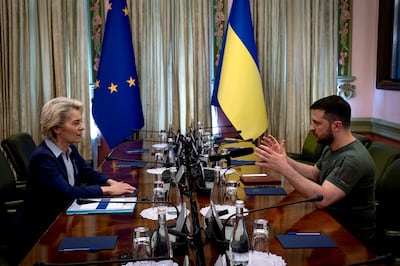Ursula von der Leyen will run for re-election as president of the European Commission, she confirmed on Monday, promising to defend the EU’s values at a time of conflict and rising nationalism.
Ms von der Leyen, 65, was nominated by her German conservative party to fly the flag of a broad centre-right alliance at European Parliament elections in June.
In office since 2019, she is seeking a second five-year term as head of the commission, the EU’s powerful headquarters that runs joint European policies on everything from climate change to defence.
Polls suggest she is well placed for re-election, with the European People’s Party – which could confirm her nomination at a March congress – leading its rivals despite rising support for far-right parties.
She would then need to win the backing of the EU’s 27 leaders, who overlooked the leading election candidates in 2019 to parachute in Ms von der Leyen as a surprise compromise choice.
Sketching out the themes of her re-election campaign, Ms von der Leyen told a press conference in Berlin that “the overarching headline” was a mission to “defend democracy and values”.
“For me, the most important part is that we want to strengthen democracy,” she said.
“We want to address all the challenges around us, but in a way that people know that there’s safety and security within the European Union for them.”

Ms von der Leyen is touting her record of managing one of the most tumultuous periods in the EU's history. Her term has coincided with the Covid-19 pandemic, the wars in Ukraine and Gaza and prolonged economic turmoil.
She pledged to put a greater focus on defence, exploit the opportunities of AI and continue the EU’s work to make its economy greener and more competitive if she wins a second term.
“The world today is a completely different one to 2019,” she said. “We have achieved more than we could ever have imagined.”
There is no major challenger to Ms von der Leyen on the centre-right, with supporters hoping she will be nominated unanimously at the European People’s Party congress in March.
The Party of European Socialists, representing the broad centre-left, has pencilled in Luxembourg’s Nicolas Schmit as its lead candidate for the election, which takes place between June 6 and 9.
Political family
Born Ursula Albrecht in 1958, Ms von der Leyen is the daughter of Ernst Albrecht, an early European official, head of a chocolate biscuit company and a prominent conservative politician in West Germany.
One of seven siblings, Ms von der Leyen lived under a false name, Rose Ladson, while studying at the London School of Economics because of feared terrorist threats against her father.
Also a mother of seven, she worked as a medical doctor before entering politics. Her first ministerial post was as families minister in Angela Merkel’s CDU-led government from 2005.

As defence minister from 2013 to 2019, she was blamed for gaps in military readiness that she has tried to address in her EU role. Her coalition partners accused her of leaving the German military in a “shabby state”.
She did not run in EU elections in 2019 but her name emerged as a surprise compromise choice after leaders of the 27 EU countries failed to back her party’s designated candidate, Manfred Weber.
Without the backing of the full coalition in Berlin, the Merkel government abstained on Ms von der Leyen’s nomination but she narrowly won enough votes in Brussels to become the first female head of the commission.
Eventful term
The first two years of Ms von der Leyen's term were dominated by the Covid-19 pandemic. She came under pressure after the EU lagged the US and UK in early vaccination rates, although it eventually bought billions of doses.
Russia’s 2022 invasion of Ukraine then threw Europe into turmoil on several fronts, with Ms von der Leyen spearheading efforts to sanction Moscow and find alternatives to Russian oil and gas.
She has pledged to appoint Europe’s first ever defence commissioner if she wins a second term, as the EU struggles to ramp up arms production to keep Ukraine on a level playing field with Russia’s mobilised war economy.

Bringing in sanctions has required tough rounds of negotiations with the EU's renegade-in-chief Viktor Orban, the Prime Minister of Hungary. Difficult talks are also playing out on the EU's potential expansion to include Ukraine, Moldova and Western Balkan countries.
The new president may have to navigate the return of Donald Trump to the White House, with the Republican front-runner already ruffling feathers in Nato. The commission president typically appears jointly at international summits with the president of the European Council, Charles Michel.
Ms von der Leyen has also pushed for ambitious EU climate targets, with the next commission handed the task of setting a new carbon emissions target for 2040.
A pushback against the Green Deal has come too late to derail the EU's 2030 climate policies, which are already fixed into law, but the next commission looks likely to face a tougher political ride.


